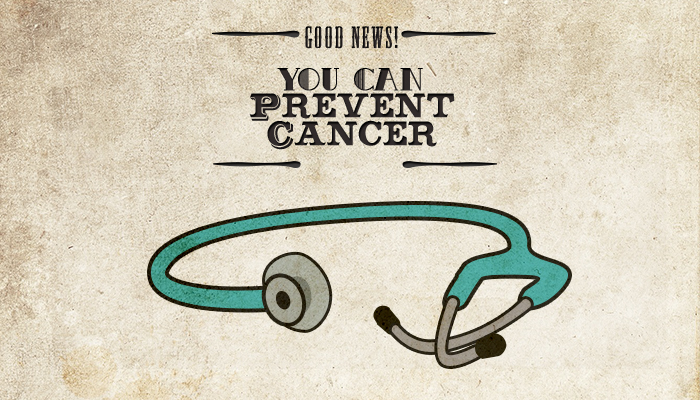Research shows that up to 50 percent of cancer cases and deaths are preventable. Prevention and early detection are more important than ever and are proven, effective strategies to lower health care costs.
One makes choices every day that affect the health. Follow these Seven Steps to Prevent Cancer to reduce the risk.
- DON’T USE TOBACCO
The use of tobacco products has been linked to many types of cancer, including lung, colorectal, breast, throat, cervical, bladder, mouth and esophageal. It’s never too late to quit. About 90 percent of all lung cancer is related to smoking. Non-smokers who are exposed to secondhand smoke are also at risk for lung cancer and other respiratory conditions.
- PROTECT SKIN FROM THE SUN
Skin cancer is the most common and most preventable cancer. More than 3.5 million skin cancers in over two million people are diagnosed annually. Exposure to the sun’s ultraviolet radiation causes most skin cancer. Be sure to use adequate sun protection year-round. Never use indoor tanning beds.
- EAT A HEALTHY DIET
Eat lots of fruits, vegetables, beans and whole grains. Limit red meat and cut out processed meats. It is also important to limit alcohol consumption because alcohol can increase the risk for liver, colorectal and breast cancers. If one drinks alcohol, have no more than two drinks a day if one is a man or one drink a day if a woman.
- MAINTAIN A HEALTHY WEIGHT AND BE PHYSICALLY ACTIVE
Getting at least 30 minutes of physical activity each day can make a big difference in the general health and well-being. Inactivity and obesity have been linked to breast and colorectal cancer, and there is also some evidence of a link to lung and pancreatic cancer. Add exercise to the routine to reduce stress, increase energy, boost the immune system, control weight and reduce the risk for cancer.
- PRACTICE SAFE SEX AND AVOID RISKY BEHAVIORS
Many strains of the Human papillomavirus, also known as HPV, are spread through skin to skin contact during vaginal, anal and oral sex. High-risk strains of HPV have increasingly been found to cause many types of cancer. The Hepatitis B virus (HBV) can also be spread from person to person through unprotected sex. It can cause long-term liver infections that can increase a person’s chance of developing liver cancer.
- GET IMMUNIZED (HPV & HEPATITIS VACCINES)
Certain viruses have been linked to cancer, but are preventable through vaccination. Talk to the healthcare professional about the age recommendations for HPV vaccines. Approximately one-third of liver cancers are linked to the Hepatitis B virus (HBV) and Hepatitis C virus (HCV). An HBV vaccination is available and is recommended for babies, older children who were not vaccinated earlier and adults who are at risk for HBV infection.
- KNOW THE FAMILY MEDICAL HISTORY AND GET REGULAR CANCER SCREENINGS
Talk to the health care professional about cancer screening. Some tests can help detect cancer early, when treatment is more likely to be successful, and some can also detect precancerous conditions before they become cancer. While screening has been proven to save lives, screening guidelines aren’t always “one size fits all.”


Leave a Reply